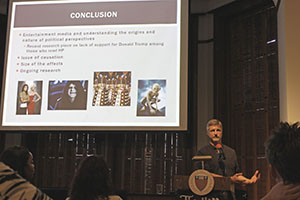Beginning with the academic conference, fans of all ages filled CHC with energy and enthusiasm.
Audience members were in for a treat on opening night of the 5th annual Harry Potter Academic Conference — the first time the conference has dedicated a day specifically for high schoolers.
Coming from as far away as California, 13 high school students (and two who were middle-school age) read essays on topics of parental estrangement with Harry, Snape and Voldemort, various character analyses, corruption of the Ministry of Magic and how it ties into political science, in which Hogwarts house Alexander Hamilton might belong, an examination of Dumbledore’s ethics using Frederic Nietzsche and more.
Each student won a scholarship to Chestnut Hill College, should they decide to attend. The first-place award was $15,000 with two runners up at $12,000 each. Another student received a $12,000 award for the most creative essay and the remaining nine students each received a $10,000 award.
On Friday, participants of all ages descended onto the campus, many sporting round black-framed glasses or lightning tattoos or dressed in Harry Potter-themed attire. Nearly 50 presenters spoke on topics within categories such as Heroes and Villains, Images of the Feminine, Pottermore, Twitter & Issues of Canon, Social Justice and Social Work, and Science and Education. Characters and text were analyzed and several speakers talked about the Harry Potter films. The Redmond Room, East Parlor and Rotunda were packed and campus was abuzz.
The scene encapsulated the vision held by the conference organizers when they first began to talk about holding such an event.
“Six years ago, we started talking about putting together a Harry Potter conference from the essays we were getting in our class,” says Patrick McCauley, Ph.D., associate professor of religious studies. “We imagined what it could become and we’ve worked hard, building the conference year by year. What happened this year was what we envisioned then.”
McCauley adds that he and Karen Wendling, Ph.D., associate professor of chemistry and co-organizer, believe the event couldn’t have gone any smoother and says it was nearly at capacity, with almost 400 participants.
“People have been so grateful to us for putting it together,” he says. “The energy and enthusiasm was amazing, and we are so grateful to everyone who came, for their support and excitement and the willingness, on the part of so many, to travel so far. We always felt that if we put in the work, there would be many eager to come and present and to attend and create this unprecedented community of people.”
That the academic conference has become so cross-cultural, productively interactive and interdisciplinary was not part of the original plan, but rather something that evolved organically. Presenters use the Harry Potter series as the jumping off point through which they delve more deeply into various topics — academics and non-academics alike use Harry Potter as a means to discuss history, feminism, library studies, psychology, religion and so much more.
“It has become one of the most interdisciplinary conferences there is in the United States,” McCauley adds. “The idea of having a dream come true isn’t something everyone gets to experience.”
Harry Potter’s Magic
The day’s first plenary lecture, "Fighting the Battle Against Stigma and Group Segregation with the Magic of Harry Potter,” was given by Loris Vezalli, Ph.D., associate professor at the University of Modena and Reggio Emilia in Italy where he teaches courses of social psychology and relations between groups. He opened by calling the Harry Potter series of books a “manual of social psychology,” and went on to discuss his research around the ways the books address social, cultural and psychological issues.
“The greatest magic of Harry Potter is reducing prejudice,” he said. “Creating positive interactions between groups result in improved relationships. Reading stories about positive interactions can work as well.”
He acknowledged that it can be a challenge to get many youngsters to read, and the Harry Potter books have succeeded in that area beyond all expectations.
Vezalli’s studies found that the more a child identified with Harry Potter, the more they could identify with an immigrant child with whom they were paired. The identification with the fictional character seemed to reduce prejudice by fostering psychological closeness.
“Reading Harry Potter should improve attitudes toward stigmatized groups,” he said.

Vezalli published his findings in the February 2015 issue of the Journal of Applied Social Psychology in the article, “The Greatest Magic of Harry Potter: Reducing Prejudice.”
The second plenary lecture, “Do Fictional Stories Really Make Us More Tolerant and Accepting?” was presented by Jack Gierzynski, Ph.D., a professor at the University of Vermont. Gierzynski’s area of study is American politics with specific interests in mass media, elections, campaign finance and political parties.
“Among the biggest lessons of the Harry Potter series are that actions have consequences,” he began. “The political lessons we can take away are those of diversity and acceptance.”
The author of four books, including 2013’s “Harry Potter Research Methods and the Politics of the Muggle Generation,” called Harry Potter a model of acceptance and attributes its influence to the narrative transportation theory that says readers who are focused on a story enter a “unique subjective state” and are transported into the world about which they are reading.
“When we’re transported like that, our guards are down and we don’t realize we’re being persuaded,” he said. “That can evoke a change of beliefs. But it’s rare to select fiction based on its political messages … we don’t often realize the political nature of a story.”
Gierzynski continued to discuss the influence the books have had on Millennials, especially, making the point that individuals are more open and receptive during adolescence, which is the era in which most of them discovered Harry Potter.
“There is overwhelming evidence of immersion into the Harry Potter world by readers,” he said. “Compared to non-fans, fans have warmer feelings toward discriminated groups and have more political tolerance.”
The Annual Philadelphia Brotherly Love Cup Draws Record Crowds
Despite overcast skies and chilly air, thousands made their way through the town of Chestnut Hill the day after the conference, where the annual festival was bigger than ever and included Defense Against the Dark Arts classes, sorting hat demonstrations, fortune tellers, Quidditch training, crafts, face painting and all kinds of food.
Many of those who spent time in town made it to campus in time for the 7th Annual Philaelphia Brotherly Love Cup Quidditch Tournament. Nine college teams and one community team participated in the tournament, which was won by the community team, the Philadelphia Honey Badgers.
— Brenda Lange
— Marilee Gallagher ’14
SAVE THE DATE - 2017 Harry Potter Academic Conference and 8th Annual Brotherly Love Cup Quidditch Tournament will take place October 20-21, 2017. Watch Connections for more information.
This story originally appeared in the October 2016 issue of Connections. To read more from that issue, click here.







